Anoxic encephalopathy - Study guides, Class notes & Summaries
Looking for the best study guides, study notes and summaries about Anoxic encephalopathy? On this page you'll find 61 study documents about Anoxic encephalopathy.
Page 2 out of 61 results
Sort by
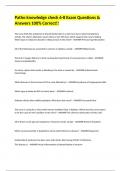
-
Patho knowledge check 6-8 Exam Questions & Answers 100% Correct!!
- Exam (elaborations) • 4 pages • 2024
- Available in package deal
-
- $15.49
- + learn more
The nurse finds the symptoms of thyroid dysfunction in a client are due to abnormal pituitary activity. The client's laboratory report shows a low TSH level, which supports the nurse's finding. Which type of endocrine disorder is likely present in the client? - ANSWER-Primary hyperthyroidism All of the following are associated to seizures in epilepsy, except: - ANSWER-Bilateral pain The lack of oxygen delivery to brain causing decreased levels of consciousness is called: - ANSWER-Anoxic ...
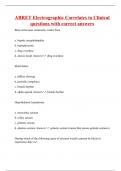
-
ABRET Electrographic Correlates to Clinical questions with correct answers
- Exam (elaborations) • 11 pages • 2023
- Available in package deal
-
- $14.49
- + learn more
Beta coma most commonly results from a. hepatic encephalopathy b. hypoglycemia c. drug overdose d. anoxic insult Answer drug overdose Skull defect a. diffuse slowing b. periodic complexes c. breach rhythm d. alpha squeak Answer breach rhythm Hypothalamic hamartoma a. myoclonic seizure b. reflex seizure c. gelastic seizure d. absence seizure Answer gelastic seizure (tumor that causes gelastic seizures) During which of the following types of seizures would a patient be l...
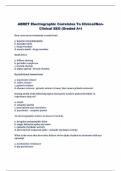
-
ABRET Electrographic Correlates To Clinical/NonClinical EEG (Graded A+)
- Exam (elaborations) • 6 pages • 2024
- Available in package deal
-
- $12.99
- + learn more
ABRET Electrographic Correlates To Clinical/NonClinical EEG (Graded A+) Beta coma most commonly results from a. hepatic encephalopathy b. hypoglycemia c. drug overdose d. anoxic insult - drug overdose Skull defect a. diffuse slowing b. periodic complexes c. breach rhythm d. alpha squeak - breach rhythm Hypothalamic hamartoma a. myoclonic seizure b. reflex seizure c. gelastic seizure d. absence seizure - gelastic seizure (tumor that causes gelastic seizures) During which of the fo...
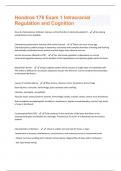
-
Hondros 176 Exam 1 Intracranial Regulation and Cognition Questions And Answers With 100% Correct Answers
- Exam (elaborations) • 13 pages • 2024
- Available in package deal
-
- $7.99
- + learn more
How do cholinesterase inhibitors improve cortical function in dementia patients? - By making acetylcholine more available. Characterize psychomotor seizures (AKA partial seizure) - These can occur at any age. Characterized by sudden change in awareness associated with complex distortion of feeling and thinking and partially coordinated motor activity and last longer than absence seizures Are the hormones effected by ICR? - Yes. Hormonal regulation is dependent on normal intracranial regula...
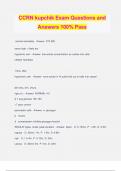
-
CCRN kupchik Exam Questions and Answers 100% Pass
- Exam (elaborations) • 24 pages • 2024
- Available in package deal
-
- $12.49
- + learn more
CCRN kupchik Exam Questions and Answers 100% Pass normal osmolality - Answer- 275-295 osmo high = likely dry hypotonic soln - Answer- low solute concentration so rushes into cells cellular hydration 1/2ns, d5w hypertonic soln - Answer- more solute in IV pulls fluid out of cells into vessel d51/2ns, d10, 3%ns hgb a1c - Answer- NORMAL 4-5 6-7 avg glucose 100-150 >7 poor control pancreatic cells - Answer- a- glucagon b - insulin d - somatostatin (inhibits glucagon/insulin) INSULIN...
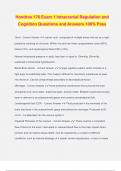
-
Hondros 176 Exam 1 Intracranial Regulation and Cognition Questions and Answers 100% Pass
- Exam (elaborations) • 18 pages • 2024
- Available in package deal
-
- $12.49
- + learn more
Hondros 176 Exam 1 Intracranial Regulation and Cognition Questions and Answers 100% Pass Skull - Correct Answer ️️ -cranial vault- composed of multiple bones that act as a rigid protective covering for the brain. Within the skull are three compartments: brain (80%), blood (10%), and cerebrospinal fluid (CSF) (10%). Normal intracranial pressure in adult: less than or equal to 15mmHg. 20mmHg sustained is intracranial hypertension. Blood-Brain barrier - Correct Answer ️️ -Unique capi...
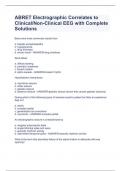
-
ABRET Electrographic Correlates to Clinical/Non-Clinical EEG with Complete Solutions
- Exam (elaborations) • 6 pages • 2023
-
Available in package deal
-
- $10.99
- + learn more
ABRET Electrographic Correlates to Clinical/Non-Clinical EEG with Complete SolutionsABRET Electrographic Correlates to Clinical/Non-Clinical EEG with Complete SolutionsABRET Electrographic Correlates to Clinical/Non-Clinical EEG with Complete SolutionsABRET Electrographic Correlates to Clinical/Non-Clinical EEG with Complete Solutions Beta coma most commonly results from a. hepatic encephalopathy b. hypoglycemia c. drug overdose d. anoxic insult - ANSWER-drug overdose Skull defect ...
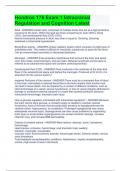
-
Hondros 176 Exam 1 Intracranial Regulation and Cognition Latest
- Exam (elaborations) • 10 pages • 2023
-
- $10.99
- + learn more
Skull - ANSWER-cranial vault- composed of multiple bones that act as a rigid protective covering for the brain. Within the skull are three compartments: brain (80%), blood (10%), and cerebrospinal fluid (CSF) (10%). Normal intracranial pressure in adult: less than or equal to 15mmHg. 20mmHg sustained is intracranial hypertension. Blood-Brain barrier - ANSWER-Unique capillary system which consists of a tight layer of endothelial cells. This makes it difficult for neurotoxic substances to pass...
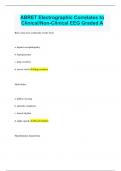
-
ABRET Electrographic Correlates to Clinical/Non-Clinical EEG Graded A
- Exam (elaborations) • 15 pages • 2023
-
Available in package deal
-
- $9.99
- + learn more
ABRET Electrographic Correlates to Clinical/Non-Clinical EEG Graded A Beta coma most commonly results from a. hepatic encephalopathy b. hypoglycemia c. drug overdose d. anoxic insult drug overdose Skull defect a. diffuse slowing b. periodic complexes c. breach rhythm d. alpha squeak breach rhythm Hypothalamic hamartoma a. myoclonic seizure b. reflex seizure c. gelastic seizure d. absence seizure gelastic seizure (tumor that causes gelastic seizures) During which of the following typ...
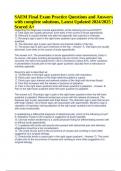
-
SAEM Final Exam Practice Questions and Answers with complete solutions, Latest Updated 2024/2025 | Scored A+
- Exam (elaborations) • 176 pages • 2024
- Available in package deal
-
- $16.49
- + learn more
SAEM Final Exam Practice Questions and Answers with complete solutions, Latest Updated 2024/2025 | Scored A+. Regarding the diagnosis of acute appendicitis, all the following are true EXCEPT: A. Vital signs are usually abnormal, even early in the course of acute appendicitis. B. Rebound is usually elicited only after the appendix has ruptured or infarcted. C. Rovsing's sign is pain in the right lower quadrant upon palpation of the left lower quadrant. D. The obturator sign is pain upon fle...

That summary you just bought made someone very happy. Also get paid weekly? Sell your study resources on Stuvia! Discover all about earning on Stuvia


